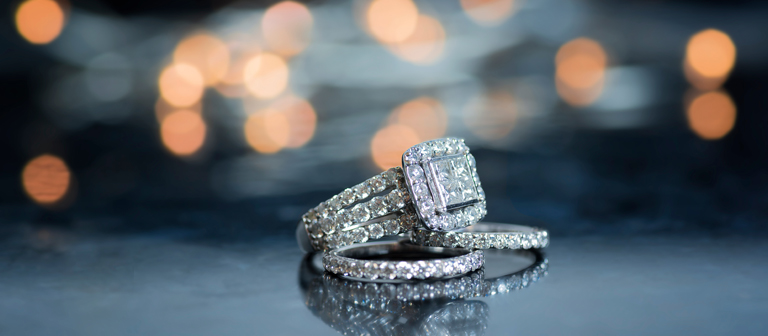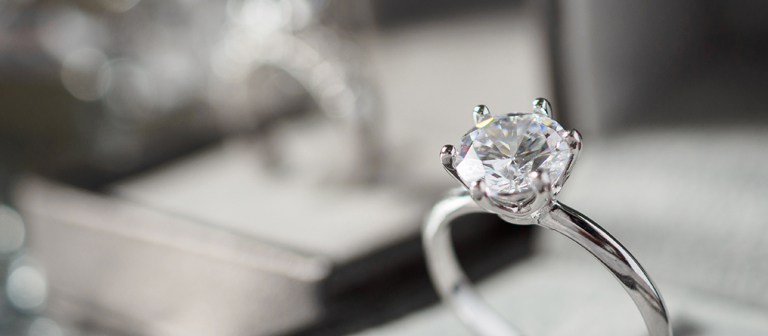
Things To Know When You Are Considering White Gold for Your Engagement Ring
What is white gold?
White gold is a popular alloy that is very commonly used for making jewelry and very often engagement rings. It is made by combining pure gold with other metals and, unlike platinum, white gold is much more abundant in its availability. Its availability makes it a popular choice for engagement rings, as well as for its elegant appearance and versatility.
How is white gold made?
Whereas platinum is mined from the earth, white gold is not naturally found in nature; rather, it is a man-made alloy. This means that white gold is created by combining gold with other metals, such as nickel and palladium. The process of creating white gold includes preparing the gold alloy, melting and mixing the metals together, and then casting or forming the desired design.
What color is white gold?
Although many people typically think of white gold as being the same visually as silver or platinum, white gold is not a true “white”. When compared next to one another, white gold has a slightly yellowish tint. This is because it has natural gold as a big component of its base. The exact composition of the alloy can vary which adjusts its color. In creating white gold, jewelers may choose different combinations based on factors such as desired color, durability, and cost.

Pros and Cons to Choosing White Gold for Your Engagement Ring
Pros
- Beautiful Aesthetic Appeal – There is a reason why white gold is a very popular choice for engagement rings. White gold possesses a timeless and sophisticated appearance sure to dazzle the receiver. Its silvery-white hue resembles platinum and stunningly complements diamonds and other gemstones in any setting while providing a luxurious look.
- Very Cost-Effective – Those looking at engagement rings may breathe a sigh of relief when they compare the costs of white gold to platinum. White gold is generally more affordable than platinum and offers a budget-friendly alternative for those seeking a precious “white” metal without a hefty price tag.
- Versatility – White gold is a highly versatile metal when it comes to engagement rings. that pairs well with different gemstones, making it an excellent choice for showcasing diamonds, sapphires, or other colorful stones.
- Durability – White gold is durable and resistant to tarnish which makes it very suitable for engagement rings and everyday wear. The nature of white gold being alloyed with other metals like nickel or palladium, enhances its strength.
- Hypoallergenic – Although white gold does run a risk for those with metal sensitivities, many white gold alloys are available with hypoallergenic properties which minimizes the risk of skin reactions.
- Design Flexibility – Jewelers enjoy working with white gold in creating one-of-a-kind engagement rings because white gold is malleable and easy to work with. This enables jewelers to create intricate and detailed designs that can add to the overall aesthetics of the engagement ring.

Cons
- Risk of Allergies and Sensitivities – As mentioned, white gold is typically an alloy of gold mixed with other metals such as nickel, zinc, or palladium to achieve its color and hardness. Some individuals may be allergic or sensitive to these alloying metals, particularly nickel, which is a common allergen. This can lead to skin irritation and discomfort for those with allergies. If your loved one has metal allergies, be sure to talk to a knowledgeable jeweler about the possibility of using white gold when you are looking to purchase an engagement ring.
- Ongoing Cost Due to Maintenance – To keep up their shiny and “white” appearance, white gold rings are often plated with rhodium, a rare and precious metal, to enhance their shine and appearance. However, this plating can wear off over time, revealing the yellowish tint of the underlying gold alloy. This plating should be reapplied periodically to maintain the ring’s luster. Maintenance and re-plating are necessary to keep the ring looking its best, and this can add to the long-term cost and upkeep of the engagement ring.
- Not as Durable as Some Metals – While white gold is considered very durable, it is also not as hard as other metals like platinum when it comes to holding stones in place. In general, white gold is not as stiff and needs regular maintenance to ensure that the prongs are still strong enough to hold the engagement ring stones in place. Maintenance is required more readily with white gold than other harder metals. This is also something to consider for individuals with active lifestyles or those who work with their hands frequently.
- Limited Natural “White” Gold – White gold is not a naturally occurring metal and is created by alloying yellow gold with other metals. Since the outcome of this creates a slightly off-white or pale yellow color, those seeking a completely natural white metal may find that platinum is a better fit.
While white gold engagement rings are undeniably beautiful and popular, as with anything, they come with their own set of cons. When choosing the perfect metal for your engagement ring look no further than Forever Diamonds if you have any lingering questions or need someone to help you reach your final decision. We are happy to work with you to find the perfect selection and ensure that you have all the information you need to consider before this momentous purchase!

